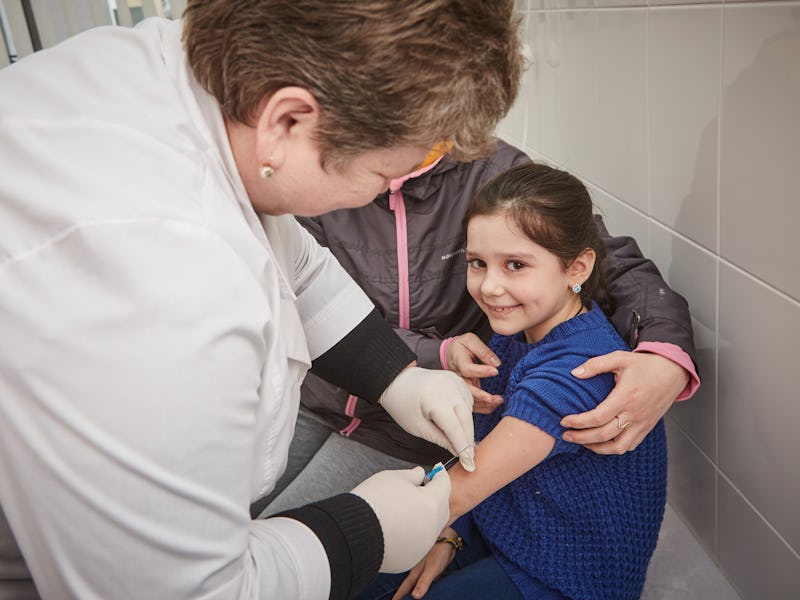Russian Bots and Trolls Linked to Spread of Anti-Vaxx Sentiment in the US
Fake news travels fast.

Whether you’re reading about pseudoscientific nonsense from Goop or thinking about corking your dick with a Jiftip, the internet adds new, strange dimensions to how people get health news all the time. Now it turns out that bots have made the internet health ecosystem even stranger as Russian actors seek to sow discord among people in the United States. Sure, bots can be fun and frivolous, falling in love (sort of) and taking you on a literary journey, but they can also amplify and distort online debates. New research in the American Journal of Public Health shows that this disinformation capacity is thriving in the dishonest debate over vaccination.
In a paper published Thursday, a team of computer scientists and public health researchers presented evidence that Twitter accounts operated by bots, trolls, or “content polluters” contributed to online debates about vaccination at much higher rates than normal people. By analyzing tweets about vaccines between 2014 and 2017, the researchers found that bots (automated accounts), trolls (real people posting inflammatory things), and content polluters (spam accounts that derail discussions by posting about both sides of an argument, as well as posting malware links) posted both pro- and anti-vaccine arguments in an effort to create a “false equivalency,” the illusion that there’s a real debate with merits on both sides. The operators of these accounts even created a unique hashtag to set the terms of the debate.
“Of the 253 messages containing #VaccinateUS, 43% were provaccine, 38% were antivaccine, and the remaining 19% were neutral,” wrote the study’s authors.
A popular anti-vaccine hoax is that they cause autism, but the research that allegedly showed the link turned out to be falsified.
This all may sound trivial since the science is quite settled on the matter: Vaccines help prevent illness in individuals and in populations. But when people are exposed to anti-vaccine messaging, they can become less certain about whether there’s a scientific consensus. Then, when they go to look for information on both sides of the so-called vaccine debate, they’ll be exposed to a lot of false information warning about the dangers of vaccines. What’s more, there was a clear purpose behind this trend.
The researchers write that a unique hashtag in this debate, “#VaccinateUS,” was used by accounts linked to the Internet Research Agency, a well-known Russian propaganda operation. This connection was outlined in an exposé on Russian troll accounts by NBC News.
“These trolls seem to be using vaccination as a wedge issue, promoting discord in American society,” Mark Dredze, Ph.D. an associate professor of computer science at Johns Hopkins University and one of the authors on the study, told The Guardian. “By playing both sides, they erode public trust in vaccination, exposing us all to the risk of infectious diseases. Viruses don’t respect national boundaries.”
Driving a wedge in US politics has been a common theme of the Russian government’s interference for the past few years, a phenomenon that the Director of National Intelligence outlined in great detail in January 2017 with the publication of a report on the TV news outlet RT America. In the report, intelligence officials outline how the channel expanded Kremlin messaging to a US audience, with direct input from Russian government officials, focusing on stories that cast doubt on US institutions and democracy in general.
Considered through this lens, some of the tweets sent by the Russian accounts seem especially obvious. For instance, the researchers noted one that said, “Apparently only the elite get ‘clean’ #vaccines. And what do we, normal ppl, get?! #VaccinateUS.” This stuck out to them for its clear overtones about social class.
By posing as real people interested in having a debate, Russian Twitter accounts made the debate over vaccines appear legitimate.
“That’s not something you see from an antivaxxer,” David Broniatowski, Ph.D., one of the study’s co-authors and an assistant professor at George Washington University who focuses on data engineering and public health, told The Washington Post. “Elites getting clean vaccines — we thought that was very unique to the Russian trolls and could be interpreted as an attempt to link vaccination to a specific division within American society.”
Another tweet read, “Did you know there was secret government database of #Vaccine-damaged child? #VaccinateUS,” which demonstrated an even more obvious attempt to paint a picture of government misinformation.
So while the debate over potential health risks of vaccination, which can be traced in large part to data fabricated by discredited doctor Andrew Wakefield, does not have merit as a debate, Russian trolls make use of a web platform like Twitter to keep it alive and cast doubt on a routine health intervention that saves lives. In this way, the Twitter accounts involved in this study contribute to an internet ecosystem in which it’s hard to discern good information from the bad.
The researchers note that, in the future, public health officials should consider the very real possibility that debates over matters concerning public health this may be fabricated or exaggerated. Welcome to the future.